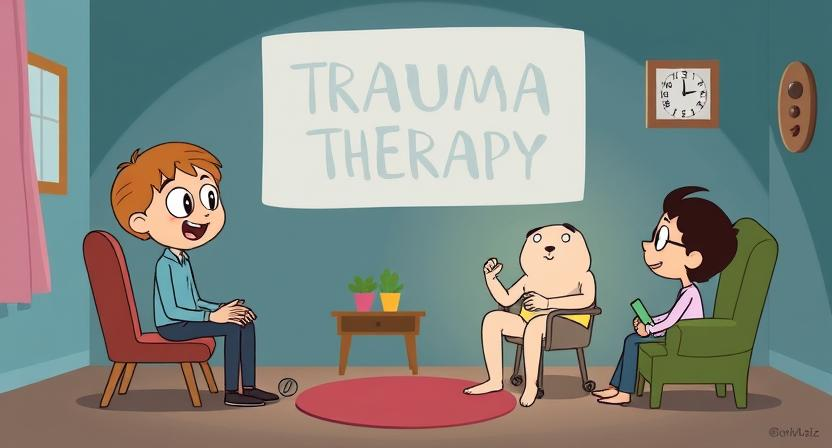Introduction: Understanding the Complexity of Trauma Therapy
Trauma therapy is a challenging yet essential process for anyone seeking to heal from the scars left by traumatic experiences. Whether stemming from childhood abuse, loss, violence, or other distressing events, trauma can have a lasting impact on a person’s mental and emotional well-being. Healing from trauma is often a complex journey that requires professional guidance, time, and immense patience. Trauma therapy is the tool that helps individuals rebuild their mental health, but it is rarely an easy road. In this article, we will explore why trauma therapy is so hard and discuss various factors that contribute to its complexity while emphasizing the importance of persevering through the difficulties for mental health recovery.
What Is Trauma Therapy? A Closer Look at the Process
Trauma therapy refers to the therapeutic techniques and interventions designed to help individuals process and heal from the psychological and emotional effects of traumatic experiences. The goal is to reduce the overwhelming emotional responses to trauma and promote healing. Trauma therapy may involve different techniques, each with its own approach.
Types of Trauma Therapy:
- EMDR (Eye Movement Desensitization and Reprocessing): This therapy uses guided eye movements to help individuals reprocess and make sense of traumatic memories.
- CBT (Cognitive Behavioral Therapy): This approach focuses on changing the harmful thought patterns and behaviors caused by trauma.
- Somatic Therapy: This type of therapy emphasizes body awareness and healing, acknowledging that trauma often manifests physically.
Each of these trauma therapy techniques aims to provide a safe space for clients to face their traumatic memories and work through them in a constructive and healing way.
Why Is Trauma Therapy So Hard? The Emotional Challenges
One of the most significant reasons why trauma therapy is difficult is the emotional toll it takes. Recalling and reliving traumatic experiences can be emotionally overwhelming, often evoking feelings of fear, guilt, sadness, or anger. The human psyche naturally seeks to avoid pain, and trauma therapy often requires confronting that pain head-on. For many individuals, the emotional challenges in trauma therapy may feel insurmountable, leading to resistance or reluctance to continue the process.
Despite the difficulty, facing the emotional pain is a critical part of the healing journey. It allows individuals to process the trauma, understand its effects on their mental health, and work towards emotional recovery.
The Brain and Trauma: How Neuroscience Explains the Struggle
Understanding the impact of trauma on the brain is essential in explaining why trauma therapy is so difficult. Trauma affects the brain’s neural pathways, particularly the amygdala, which governs fear responses, and the hippocampus, which is responsible for memory processing. When a traumatic event occurs, these areas of the brain become hyperactive, often leading to exaggerated fear responses and difficulty integrating memories.
The fight-or-flight response triggered by trauma can remain active long after the traumatic event, making it difficult for individuals to feel safe or to regulate their emotions. This constant state of hyperarousal can make it challenging to rewire the brain through therapy, and recovery often requires consistent, focused effort over time.
The Role of Resistance and Avoidance in Trauma Therapy
Resistance and avoidance are common in trauma therapy, even when individuals understand that healing is necessary. The fear of reliving trauma or becoming vulnerable often leads individuals to resist engaging in therapy. This fear can manifest in several ways, such as avoiding certain topics or not fully participating in sessions.
Avoidance behaviors are often protective mechanisms that the brain uses to prevent distress. While these mechanisms may provide temporary relief, they also hinder the healing process. Overcoming resistance in therapy is crucial, and it requires trust in the therapeutic process and the ability to confront pain in a safe, controlled environment.

The Importance of the Therapist-Client Relationship
The relationship between the therapist and client plays a central role in trauma therapy. Trust and rapport are essential for creating a safe space where the individual feels comfortable confronting painful memories. Without a strong connection with the therapist, the healing process can be significantly hindered.
Finding the right trauma therapist can be challenging, as not all therapists are equipped with the specific skills needed to address trauma. It’s essential for clients to feel heard and understood by their therapist, making the therapist-client relationship a cornerstone of effective trauma therapy.
Cultural and Societal Stigmas Around Trauma and Therapy
Cultural barriers and societal stigma can make trauma therapy more difficult to pursue. Many cultures hold negative views about mental health issues, leading to shame and silence surrounding trauma. This stigma can create internal and external pressures that prevent individuals from seeking help, even when it’s desperately needed.
Breaking down mental health stigma and fostering a culture of openness and acceptance is essential for improving access to trauma therapy. Overcoming cultural misconceptions and societal barriers is vital for individuals to feel empowered to seek support.
The Physical and Psychological Symptoms of Trauma
Trauma can manifest in both physical symptoms such as chronic pain, fatigue, and digestive issues, as well as psychological symptoms like anxiety, depression, and PTSD. These physical and emotional symptoms can make the therapeutic process more challenging because they often act as constant reminders of the trauma.
For example, chronic pain can interfere with one’s ability to focus during therapy, while emotional numbness or anxiety may make it difficult to engage with others or open up about traumatic memories. These complex, overlapping symptoms require a holistic approach to healing that integrates both physical and psychological care.
The Long Road to Healing: Why Trauma Therapy Takes Time
Healing from trauma is a long and nonlinear process. Many individuals expect quick results, but trauma therapy often requires time, patience, and consistent effort. The road to healing can be filled with setbacks, and progress may feel slow, leading to frustration and discouragement.
Self-compassion is crucial during this journey. Understanding that healing is not linear helps individuals remain patient with themselves. Trauma therapy is about gradual progress, not perfection, and learning to accept the pace of recovery can be liberating.
Coping Strategies for Navigating the Difficulties of Trauma Therapy
While trauma therapy is inherently challenging, there are several coping strategies that can help individuals navigate the process more effectively:
- Mindfulness: Practicing mindfulness techniques can help individuals stay grounded and reduce anxiety during therapy.
- Self-Care: Prioritizing self-care routines, such as exercise, proper nutrition, and relaxation, can support emotional and physical well-being.
- Support Systems: Building a strong support system of family, friends, or support groups can provide encouragement and understanding throughout the healing process.
- Journaling or Art Therapy: Expressing emotions through creative outlets can aid in the processing of trauma.
Implementing these strategies can help individuals manage the challenges that arise during trauma therapy.
Success Stories: How Trauma Therapy Can Transform Lives
While trauma therapy can be difficult, the benefits of sticking with the process are profound. Many individuals who have undergone trauma therapy report significant improvements in their mental health, relationships, and overall well-being. For example, survivors of abuse or violence often find that therapy helps them regain a sense of control over their lives, allowing them to move beyond their trauma and experience joy once again.
These success stories serve as powerful reminders that, despite the hardships, trauma therapy can transform lives. With time, patience, and the right therapeutic support, healing is possible.
Conclusion: Embracing the Challenge of Trauma Therapy
In conclusion, trauma therapy is undoubtedly difficult, but it is also an essential part of healing from the emotional and psychological wounds left by trauma. While the journey may be filled with emotional pain, resistance, and setbacks, the long-term benefits of trauma therapy are invaluable. By embracing the challenges of therapy, individuals can work towards reclaiming their mental health and building a brighter future.
If you or someone you know is struggling with trauma, seeking professional help is the first step toward healing. Don’t let the difficulty of the process deter you, trauma therapy is worth the effort, and with the right support, recovery is possible.
Bonus: FAQs About Trauma Therapy
Q: What are the signs that indicate I might benefit from trauma therapy?
A: If you are struggling with symptoms such as persistent anxiety, depression, nightmares, or flashbacks following a traumatic experience, trauma therapy could be beneficial. A professional therapist can help assess your situation and guide you in the healing process.
Q: What if therapy feels too hard?
A: It is normal for therapy to feel difficult, especially when confronting painful memories. If you feel overwhelmed, discuss your feelings with your therapist, who can adjust the approach to better suit your emotional needs.
Q: How long does trauma therapy take?
A: Trauma therapy is a long-term process that varies for each individual. Healing is not linear, and the duration of therapy depends on the severity of the trauma and the pace at which you progress.

